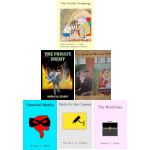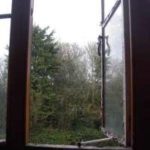Dickimaw Books Blog 
Imagination 🔗
[Originally posted on Goodreads 2016-04-06.] One of the most common questions that I’m asked about my writing is “Where do you get your imagination from?” I always find this difficult to answer as it sounds like asking “How do you daydream?” My question is “How do you stop daydreaming?” as this can be a major issue for me. Ooh, look at that smudge. It’s shaped a bit like a dragon. Hmm, dragons… Sorry, what were we talking about?
Imagination is shaped by our senses. Since pre-history, our ancestors have observed the world, and these observations spark ideas that can lead to stories (or scientific discoveries). For some reason, I seem to have a blind spot for things that most people notice, such as a friend’s new clothes or haircut (the most notable occasion being when I walked right past a bucket full of roses that my husband had bought for our first wedding anniversary — I’ll never live that one down¹) but little things of no consequence can trigger musings that can follow such a labyrinthine path that I forget the original observation that set off my thoughts. The same observation can lead to different ideas for different people. For example, if I see a crow pecking at roadkill it leads to a children’s story about road safety and stranger-danger (The Foolish Hedgehog), but for someone else it might lead to a horror story.
When I was a child, there was plenty to stimulate my imagination, some of which I’ve already mentioned. At this point I’m going to shamelessly plug my brother’s book Into the Lion’s Den: A Biographical History of the Talbots of Malahide, which was reviewed by the Irish Independent because imagination can thrive when the family grapevine includes rumours of alleged spies and, centuries earlier, a rather blatant breach of sacred hospitality involving murder at breakfast. Most of the holidays that I can remember involved visiting relatives which, to me, was far more interesting than theme parks or hot, sandy beaches, as some of them had big, old houses. One that particularly stands out in my mind is the place where one of my father’s aunts used to live. (It was certainly big from the point of view of a six year old who lived in a small terraced house.) My two older brothers and I slept in attic rooms when we visited (my next sibling down was only a baby at the time) with sloping ceilings and dark corners. The views consisted of a kitchen garden in the rear with a scarecrow and a field in the front with a scarecrow. I’m not sure how the crows felt about them, but they certainly spooked me. On top of the hill beyond the field was a castle which, naturally, my brothers informed me was haunted. It is, after all, obligatory that older children tell the younger ones ghost stories.
When I moved up from primary school to a nearby local private school (where I was a day-girl) I was told by older girls about the phantom goalie who apparently haunted one of the lacrosse goalposts. It’s easy enough to dismiss such stories as a wind-up if you’re safely inside a populated building, but as a first former² whose classroom is in a hut on the boarder of said lacrosse pitch, it certainly stimulates the imagination. Especially in the winter during prep, which entailed walking from the main building after tea, down an unlit path, past the tennis courts, open-air swimming pool, high hedge and the pavilion that smelt of muddy boots and linseed oil, and then sitting in silence doing homework from 4:30 to 6pm. (First years got off earlier at 6pm. The older girls didn’t finish until 6:20pm.) If memory serves me well, there were only eleven of us in the class back then. It was even more entertaining when gales rattled the hut or when the foghorn was in action.
Everything around us can trigger ideas, if we are receptive to them. Sometimes I can definitively say what inspired a particular part of my stories (and close family or friends may be able to spot them, especially in my novel The Private Enemy), but sometimes I can’t pinpoint the source. The essence of long-forgotten memories can seep through the layers of detritus that have accumulated over the years, merge with other memories and blend into the imagination, inspiring stories, characters and places. Memories can be unreliable. Something that seemed large and spooky as a child, can turn out to be small and ordinary as an adult, but the distorted memory is more interesting to the story-teller. Look at the world, for a moment, from the eyes of a child and forget mundane reasoning.
However, I think that most of all, the imagination is fed by stories (regardless of whether they are novels, plays, films or relatives spinning a yarn) because most of the things I see that set me daydreaming are things that remind me of something I’ve read or heard or watched. Stories are built on imagination, but they also feed the imagination. If, after you put down a book, you find yourself thinking about the characters and the world they inhabit, then don’t ask me where I got my imagination from, because you’ve got one as well.
Daydreaming is easy. The hard part is converting those thoughts into words that can hook readers and, in turn, stimulate their imagination.
¹In all fairness, he had cunningly hidden them behind a bicycle as he’d bought them the day before. My absent-mindedness at least meant that the surprise wasn’t spoilt.
²First form in secondary school is now Year 7 these days.
Next Post
Previous Post
Recent Posts
 There are a growing number of digital historians who are interested in documenting old computing systems from the twentieth century, but much of the information has been lost and coincident names can make it hard to search. This article is about the RISC OS ARMTeX distribution, which provided TeX and LaTeX for the ARM-powered Acorn computers in the 1990s.
There are a growing number of digital historians who are interested in documenting old computing systems from the twentieth century, but much of the information has been lost and coincident names can make it hard to search. This article is about the RISC OS ARMTeX distribution, which provided TeX and LaTeX for the ARM-powered Acorn computers in the 1990s. The DRM-free ebook retailer SmashWords has its annual Summer/Winter sale from 1st – 31st July 2025. My crime novel “The Private Enemy” and children’s illustrated story “The Foolish Hedgehog” both have a 50% discount, and my crime fiction short stories “I’ve Heard the Mermaid Sing”, “Unsocial Media”, “Smile for the Camera”, and “The Briefcase” have a 100% discount (i.e. free!) for the duration of the sale. Did you know that you can gift ebooks on SmashWords?
The DRM-free ebook retailer SmashWords has its annual Summer/Winter sale from 1st – 31st July 2025. My crime novel “The Private Enemy” and children’s illustrated story “The Foolish Hedgehog” both have a 50% discount, and my crime fiction short stories “I’ve Heard the Mermaid Sing”, “Unsocial Media”, “Smile for the Camera”, and “The Briefcase” have a 100% discount (i.e. free!) for the duration of the sale. Did you know that you can gift ebooks on SmashWords? If you have read my short story Smile for the Camera, did you notice that the ending could have two possible interpretations? (No spoilers please!) As a writer, it’s always difficult to tell if something is too obvious or too obscure. If you need a hint, consider the naming scheme and remember that not everyone is what they say or imply that they are.
If you have read my short story Smile for the Camera, did you notice that the ending could have two possible interpretations? (No spoilers please!) As a writer, it’s always difficult to tell if something is too obvious or too obscure. If you need a hint, consider the naming scheme and remember that not everyone is what they say or imply that they are. The Ex-Cathedra writing group were delighted to present a cheque for £1,400 to St Martins Housing Trust during their collection at Tesco Harford Bridge on 6th December 2024. The money was raised from sales of the book Tales for Our Times, an anthology of short stories written by the group. The cheque was received by Ian Hanwell on behalf of St Martins. Many thanks to the support of everyone who purchased a copy and to the staff at Tesco Harford Bridge for allowing us to make the presentation there.
The Ex-Cathedra writing group were delighted to present a cheque for £1,400 to St Martins Housing Trust during their collection at Tesco Harford Bridge on 6th December 2024. The money was raised from sales of the book Tales for Our Times, an anthology of short stories written by the group. The cheque was received by Ian Hanwell on behalf of St Martins. Many thanks to the support of everyone who purchased a copy and to the staff at Tesco Harford Bridge for allowing us to make the presentation there. Search Blog
📂 Categories
- Autism
- Books
- Children’s Illustrated Fiction
- Illustrated fiction for young children: The Foolish Hedgehog and Quack, Quack, Quack. Give My Hat Back!
- Creative Writing
- The art of writing fiction, inspiration and themes.
- Crime Fiction
- The crime fiction category covers the crime novels The Private Enemy and The Fourth Protectorate and also the crime short stories I’ve Heard the Mermaid Sing and I’ve Heard the Mermaid Sing.
- Fiction
- Fiction books and other stories.
- Language
- Natural languages including regional dialects.
- (La)TeX
- The TeX typesetting system in general or the LaTeX format in particular.
- Music
- Norfolk
- This category is about the county of Norfolk in East Anglia (the eastern bulgy bit of England). It’s where The Private Enemy is set and is also where the author lives.
- RISC OS
- An operating system created by Acorn Computers in the late 1980s and 1990s.
- Security
- Site
- Information about the Dickimaw Books site.
- Software
- Open source software written by Nicola Talbot, which usually has some connection to (La)TeX.
- Speculative Fiction
- The speculative fiction category includes the novel The Private Enemy (set in the future), the alternative history novel The Fourth Protectorate, and the fantasy novel Muirgealia.
🔖 Tags
- Account
- Alternative History
- Sub-genre of speculative fiction, alternative history is “what if?” fiction.
- book samples
- Bots
- Conservation of Detail
- A part of the creative writing process, conservation of detail essentially means that only significant information should be added to a work of fiction.
- Cookies
- Information about the site cookies.
- Dialect
- Regional dialects, in particular the Norfolk dialect.
- Docker
- Education
- The education system.
- Ex-Cathedra
- A Norfolk-based writing group.
- Fantasy
- Sub-genre of speculative fiction involving magical elements.
- File formats
- FlowframTk
- A vector graphics application written in Java that can export to pgf picture drawing code but can also be used to construct frames for use with the flowfram package. Home page: dickimaw-books.com/software/flowframtk. (FlowframTk was originally called JpgfDraw.)
- Hippochette
- A pochette (pocket violin) with a hippo headpiece.
- History
- I’ve Heard the Mermaid Sing
- A crime fiction short story (available as an ebook) set in the late 1920s on the RMS Aquitania. See the story’s main page for further details.
- Inspirations
- The little things that inspired the author’s stories.
- Linux
- Migration
- Posts about the website migration.
- Muirgealia
- A fantasy novel. See the book’s main page for further details.
- News
- Notifications
- Online Store
- Posts about the Dickimaw Books store.
- Quack, Quack, Quack. Give My Hat Back!
- Information about the illustrated children’s book. See the book’s main page for further details.
- Re-published
- Articles that were previously published elsewhere and reproduced on this blog in order to collect them all together in one place.
- Sale
- Posts about sales that are running or are pending at the time of the post.
- Site settings
- Information about the site settings.
- Smile for the Camera
- A cybercrime short story about CCTV operator monitoring a store’s self-service tills who sees too much information.
- Story creation
- The process of creating stories.
- TeX Live
- The Briefcase
- A crime fiction short story (available as an ebook). See the story’s main page for further details.
- The Foolish Hedgehog
- Information about the illustrated children’s book. See the book’s main page for further details.
- The Fourth Protectorate
- Alternative history novel set in 1980s/90s London. See the book’s main page for further details.
- The Private Enemy
- A crime/speculative fiction novel set in a future Norfolk run by gangsters. See the book’s main page for further details.
- Unsocial Media
- A cybercrime fiction short story (available as an ebook). See the story’s main page for further details.
- World Book Day
- World Book Day (UK and Ireland) is an annual charity event held in the United Kingdom and the Republic of Ireland on the first Thursday in March. It’s a local version of the global UNESCO World Book Day.
- World Homeless Day
- World Homeless Day is marked every year on 10 October to draw attention to the needs of people experiencing homelessness.



